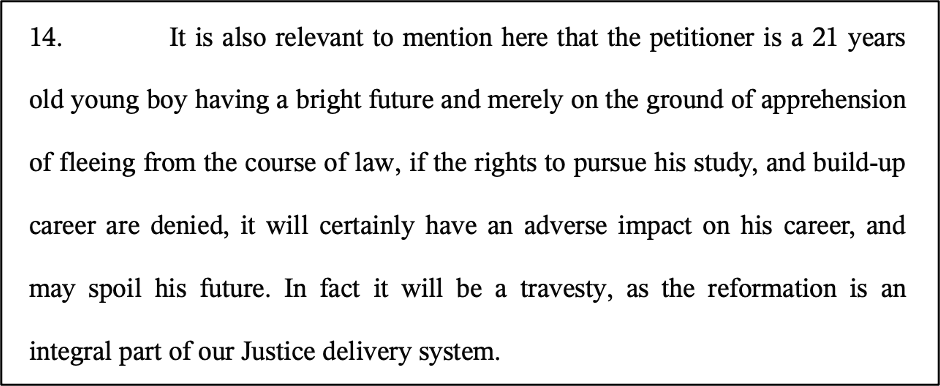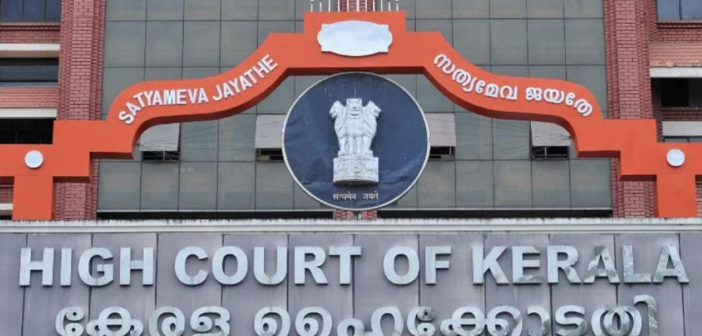In this edition of court judgements review, we look at the Kerala HC order which said that income of a parent who has abandoned the family should not be considered when determining eligibility for an EWS reservation, Delhi HC’s order that freedom of speech is not absolute and is subject to reasonable restrictions, SC’s order where it said that absence of documentary proof for cash does not invalidate transaction, among others.
Kerala HC: Income of a parent who has abandoned the family should not be considered when determining eligibility for an EWS reservation
In the case, Meghna Devi and Another vs. State of Kerala and Others before the High Court of Kerala, the petitioner, a meritorious student with an All-India Rank of 1238 and an EWS Category Rank of 54 in the National Institute of Fashion Technology (NIFT) Entrance Examination, sought to avail of reservation benefits. However, she was denied the EWS certificate. The case is a writ petition filed by the student and her mother to challenge this denial.
The Tahsildar rejected the application based on three reasons: the mother’s landholding exceeded the 4.13 cents limit, the father’s income was not considered, and there was a name discrepancy for the mother on the Secondary School Certificate.
The petitioners contended that the reasons for rejection were unsustainable. They argued that only the residential portion of their land should be considered for EWS eligibility. They also provided documents showing the father abandoned the family 12 years ago, and his income should not be a factor. Furthermore, they clarified that the name “Sushadevi” on the certificate was her stepmother’s, while her legal name is Sreeja.
Justice N. Nagareesh found the reasons for rejection to be “unsustainable”. The court relied on the petitioners’ evidence, including a Location Plan and a Government Order, to confirm that the landholding was within limits for the EWS category. The court also accepted that the father’s income should not be considered, given his abandonment of the family. As a result, the writ petition was allowed, and the court set aside the rejection letter. The Tahsildar was directed to issue the EWS Certificate to Meghna Devi immediately, and the NIFT was directed to grant her admission if a seat was available and she met all other criteria.
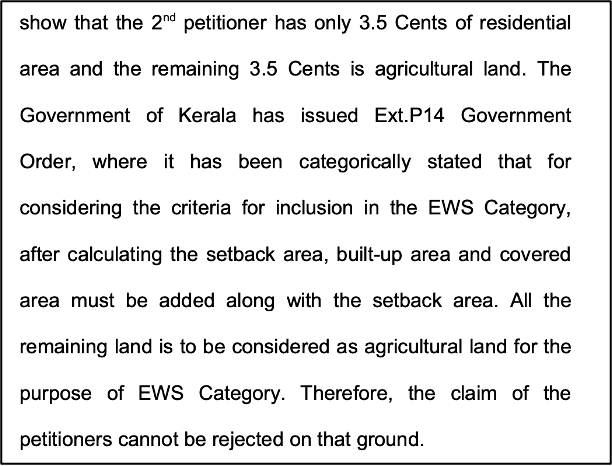
Delhi HC: Freedom of speech is not absolute and is subject to reasonable restrictions
In this case, Shyam Bharteey vs. Central Board of Film Certification Regional Officer Delhi, and Another, the petitioner is the producer and director of the Hindi film ‘Masoom Kaatil’. He filed an appeal against the Central Board of Film Certification (CBFC) after they refused to grant a certificate for public exhibition of his film. The case was heard at the High Court of Delhi.
The film was first reviewed by a five-member Examining Committee and later by an eight-member Revising Committee, both of which unanimously deemed it unfit for public release. The committees’ reasons for refusal included that the film justifies vigilantism, is communal, and contains gruesome violence, human cannibalism, and derogatory remarks towards religions and castes.
The Appellant argued that the reasons for denial were unfounded and that the committees did not review the film diligently. He contended that the film’s intent was to be “emotional and thought-provoking” on animal cruelty and requested an ‘A’ certificate with cuts to the film.
The High Court, presided over by Justice Manmeet Pritam Singh Arora, upheld the CBFC’s decision. The court noted that the film’s content, as described in the reports, was excessively violent, glorified vigilantism, and contained derogatory remarks about religions and communities. The court emphasised that such depictions could brutalise audiences, normalise lawlessness, and incite violence. Furthermore, the court highlighted the portrayal of minors involved in violence, which violates guidelines against corrupting the morality of young viewers. The court stated that artistic freedom or Freedom of Speech under Article 19(1)(a) is subject to “reasonable restrictions” and that the film’s content was fundamentally incompatible with the Cinematograph Act and its guidelines. The appeal was therefore dismissed, as the court found the Revision Committee’s order to be free from any illegality.
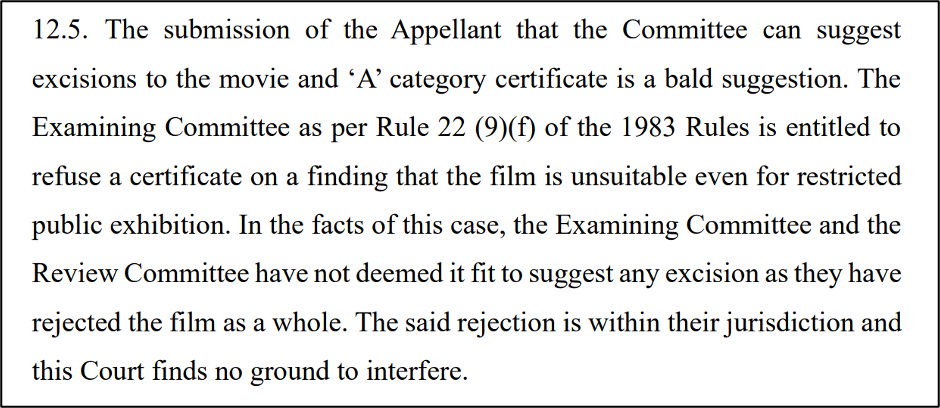
Delhi HC: Unauthorised exploitation of a famous personality’s attributes can violate both their right to protect their persona from commercial exploitation and their right to privacy and dignity
In Aishwarya Rai Bachchan vs. Aishwaryaworld.com and others, the plaintiff’s legal team contended that her extensive reputation and goodwill have given her persona significant commercial value. The defendants, including websites, an AI chatbot, and YouTube channels, were accused of a range of unauthorised activities, from impersonation to creating deepfake videos and selling merchandise with her image. These actions, they argued, mislead the public and cause “incalculable loss to her goodwill and reputation”. The lawyers also highlighted the misuse of AI to generate sexually explicit and inappropriate content in her name, which harms her dignity and causes “grave humiliation”.
Delhi High Court observed that the plaintiff had established a strong prima facie case for an injunction. The court noted that the unauthorised use of her attributes, particularly through AI, was causing both financial harm and damage to her reputation and dignity. The court found that the balance of convenience lay with the plaintiff and that not granting an immediate injunction would cause her “irreparable loss”.
The court’s verdict was to grant the injunction. It restrained the defendants from any further misuse of her persona without consent. The court also specifically ordered Defendant No. 10 (Google LLC) to take down the infringing URLs and provide the basic subscriber information of the individuals behind the unauthorised activities. The case is listed for the next hearing on 15 January 2026.
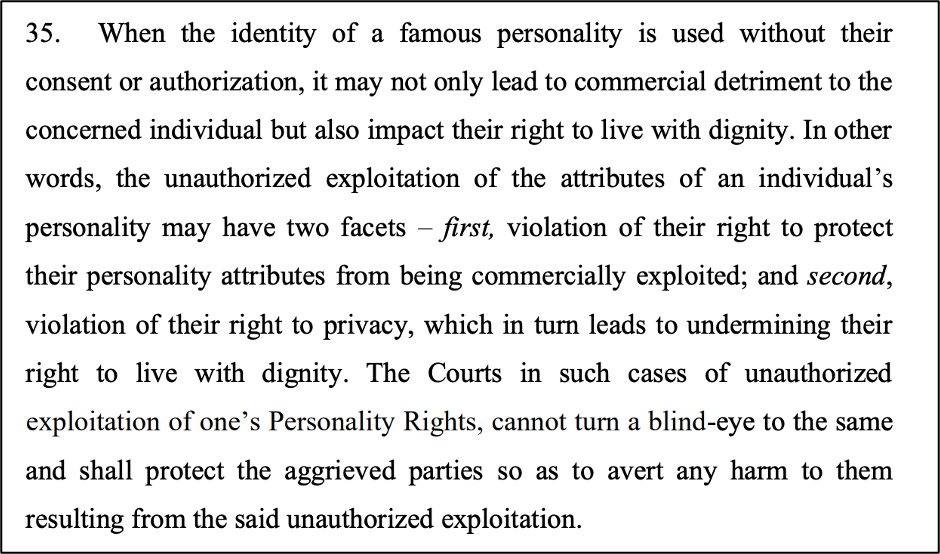
SC: Absence of documentary proof for cash does not invalidate transaction
In the civil appeal case of Georgekutty Chacko vs. M N Saji, the Supreme Court of India addressed whether a promissory note can be partially discredited. The appellant, Georgekutty Chacko, sought to recover ₹35,29,680 from the respondent, M.N. Saji, based on a promissory note. The Trial Court had upheld the full amount, but the Kerala High Court reduced it to ₹22,00,000, arguing that only this portion was proven through bank transactions and the remaining cash amount lacked documentary evidence.
The Supreme Court, however, sided with the appellant. It was observed that once the promissory note, as a complete document, was accepted, the burden was on the respondent to disprove the stated amount. The Court noted that it is “not uncommon” for money transactions to include a cash component. It explicitly stated that the absence of a documentary record for a cash payment does not negate the transaction, especially when the promissory note itself confirms the debt. The Court found the High Court’s bifurcation of the amount to be “clearly erroneous and therefore, unsustainable”.
Ultimately, the Supreme Court allowed the appeal, set aside the High Court’s order, and restored the Trial Court’s original decree for the full amount.
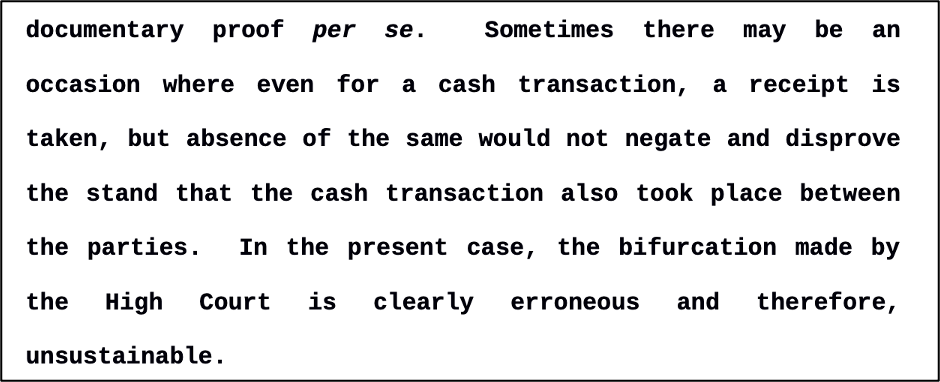
Punjab and Haryana HC: The right to go abroad is a basic human right
In the High Court of Punjab and Haryana, a bail petition was filed by Anand (Anand vs. State of Haryana), a 21-year-old student, seeking permission to travel abroad for higher education. He is currently on bail while facing prosecution under sections of the Indian Penal Code and the Scheduled Castes and Scheduled Tribes (Prevention of Atrocities) Act 1989. The trial court had denied his request, citing the prosecution’s apprehension that he might flee to avoid trial.
Anand’s counsel argued that denying him this opportunity would shatter all his future prospects and impede his fundamental right to build a career. He offered to furnish a heavy surety to ensure his return. The court, presided over by Justice Surya Partap Singh, observed that the right to travel abroad is a fundamental human right under Article 21 of the Constitution. Citing precedents, the court stated that the trial court’s decision was based on mere apprehension and lacked sound legal principles. The court noted that denying a young person with a bright future the right to study abroad would be a “travesty”.
Consequently, the High Court set aside the trial court’s order and permitted Anand to travel abroad, subject to certain conditions, including furnishing a heavy surety and an undertaking not to object if evidence is recorded in his absence.
